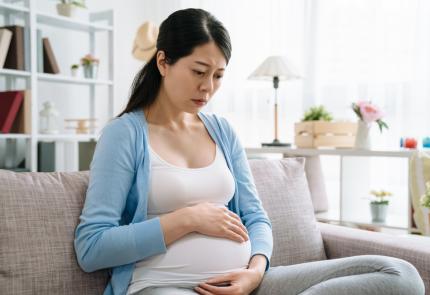About the RELAX study and its public involvement
The REduce Levels of AnXiety (RELAX) study is a randomised controlled trial testing a form of ‘brain training’ designed to reduce anxiety in pregnant woman and new mothers, an approach that has already been successful with non-pregnant people.
In the study, participants who are randomised to receive the RELAX training, as well as receiving their usual maternity care, are invited to listen to short scenarios about everyday life and pregnancy. The training is designed to help participants learn to resolve these scenarios positively and imagine themselves in the positive outcome, and by doing so gradually reduce patterns of negative thinking. Participants in the control arm of the study have their usual maternity care.
In the early days of planning the study, Professor Colette Hirsch, clinical psychologist and the study’s chief investigator, talked with community and maternity groups, including the King’s College Hospital maternity voices partnership (MVP) and Parents and Communities Together (PACT) in Southwark, a community-led social support project to empower parents and improve the health of young children. Colette also approached ARC South London’s maternity and perinatal mental health theme public advisory group, which is led by Mary Newburn. Mary became a co-applicant and the public involvement lead for the study.
Once the study successfully gained funding from the NIHR, the RELAX team held two online engagement workshops and PACT hosted a face-to-face introduction with lunch, aimed at women who had experienced worry or anxiety during pregnancy. Many women talked about how disabling their anxiety in pregnancy had been, and how it made their lives miserable. A diverse public advisory group was created made up of women who had attended one of these events, plus representatives from maternity charities and networks.
The RELAX team aims to involve the public in innovative and responsive ways:
- Public advisers have been invited to take the ‘brain-training’.
- An optional WhatsApp group is used for quick, informal communications.
- We offer online chats after formal advisory group meetings.
- RELAX researchers encourage public advisers to take public involvement and research training courses, paying reasonable course fees, and for their time.
- We all promote study recruitment, using Instagram, Facebook and Twitter, plus posters, flyers, business cards and branded mugs, water bottles and pens.
- We have a study newsletter for community and public supporters (email ‘subscribe to newsletter’ to relax@kcl.ac.uk).
- Two public advisers, Chrissy Brown and Abi, made films about lived experiences of anxiety and support for the study. These have been used to promote recruitment, including in Maternal Mental Health Week (below).
What difference has public involvement made?
Public advisers have tested the platform used for the study training sessions, commented on the length of the training sessions, the introductory text, the scenarios of everyday situations, the logo and other graphics. In response to feedback, researchers have reduced the length of each online training session from 25 to 20 minutes, shortened text and made language simpler, and kept study colours to soothing shades of blue and green.

